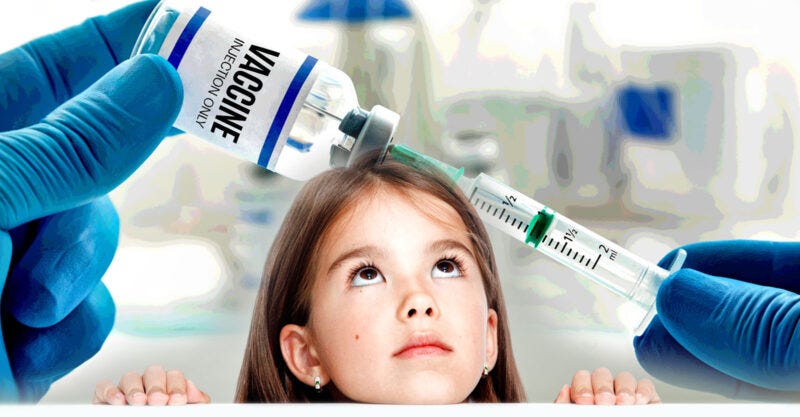Did MAHA Commission Go Far Enough on Vaccines? Fans and Critics Weigh In
The MAHA report raised eyebrows—but sidestepped the elephant in the room.
This article originally appeared on The Defender and was republished with permission.
Guest post by Michael Nevradakis, Ph.D.
The Make America Healthy Again (MAHA) Report, released last week, listed vaccines among the possible contributors to the chronic disease epidemic in the U.S. Vaccine experts and health freedom advocates praised the report for taking on the issue, but also pointed out ways in which they believe the MAHA Commission should go even further to address vaccine safety and the link between vaccines and autism.
The “landmark” Make America Healthy Again (MAHA) Report, released last week, listed vaccines among the possible contributors to the chronic disease epidemic in the U.S.
The 73-page report addressed the childhood vaccination schedule and the overvaccination of children, faulty clinical trials, conflicts of interest in regulating vaccine safety, and the censorship of narratives questioning vaccine safety were among the vaccine-related.
The report, an outcome of a February executive order establishing the MAHA Commission, was followed by Tuesday’s announcement that the Centers for Disease Control and Prevention (CDC) will no longer recommend COVID-19 vaccines for healthy children and pregnant women.
Reactions to the report and its vaccine-related content were mixed. In a Substack post, epidemiologist Nicolas Hulscher called the report “a critical and long-overdue step.”
Sayer Ji, co-founder of Stand for Health Freedom, said the report, while “brief on the vaccine issue,” notably “does not demonize the vaccine-hesitant and critical.”
Mainstream medical organizations criticized the report’s section on vaccines. In a statement, Dr. Tina Tan, president of the Infectious Diseases Society of America, said that while it is “important” to investigate the causes of chronic diseases, “vaccines are not among them.”
Other doctors and members of the health freedom movement said the report, while a positive step, did not go far enough. They said it left out some key vaccine-related issues, including the risks of mRNA vaccines, the possible link between vaccines and autism, and the law that protects vaccine makers from being held liable for injuries caused by their products.
Brian Hooker, Ph.D., chief scientific officer for Children’s Health Defense (CHD), said the report “covers many important issues regarding vaccines in the U.S.,” but that more emphasis is needed on the federal government’s “highly flawed and corrupt” vaccine injury compensation programs.
Dr. Michelle Perro, a pediatrician, said the report is commendable “for broaching the subject of vaccinology, which has been accepted by mainstream medicine as scientific dogma.” However, she said it didn’t openly discuss issues around vaccine ingredients and the suppression of data related to vaccine injuries.
Yet despite “shortcomings,” Ji said the report represents “a subtle yet significant departure from the coercive, top-down messaging that dominated during COVID-19.”
Earlier this month, the U.S. Food and Drug Administration revealed plans to limit approvals for updated COVID-19 vaccines to people over age 65 and people with health conditions that put them at high risk for the virus — part of a new “radical framework” for vaccine approval.
Report failed to address ‘elephant in the room’
The discussion about vaccines in the MAHA Commission report was contained within a broader section on the overmedicalization of Americans, particularly children, and focused extensively on the childhood vaccination schedule.
The report stated that while “vaccines benefit children by protecting them from infectious diseases,” they “can have side effects that must be balanced against their benefits.”
The report also acknowledged that many parents are concerned about the appropriate use of vaccines and their possible role in the growing childhood chronic disease crisis.
The report noted that since 1986, the number of recommended vaccines on the CDC’s childhood immunization schedule increased from three to 29 and today “exceeds the number of vaccinations on many European schedules.”
A 2023 study connected the increase in vaccine doses given to infants to a higher infant mortality rate.
According to the report, the expansion of the childhood vaccination schedule was accompanied by only a limited scientific inquiry into the links between vaccines and chronic disease, the downsides of vaccine injury and conflicts of interest in the development of the vaccine schedule.
Highlighting deficiencies in the clinical trial process for vaccines, the report called for “more rigorous clinical trial designs, including the use of true placebos, larger sample sizes, and longer follow-up periods.”
“Many vaccines on the CDC’s childhood schedule involved small participant groups, had no inert placebo-controlled trials, and had limited safety monitoring, some lasting six months or less — raising concerns about the ability to detect rare or long-term adverse effects,” the report stated.
“Prior to any roll-out of any pharmaceutical product, an extensive placebo-controlled study with a long safety monitoring protocol must be in place in order to detect harm. That has not happened to date,” Perro said.
Last month, the U.S. Department of Health and Human Services (HHS) said it would require placebo-controlled tests for new vaccines.
According to Hulscher, this is the first time a federal report has addressed the possibility that overvaccination is contributing to chronic disease in children.
Ji said the report’s refusal to “uncritically affirm” the childhood vaccination schedule or mRNA technology “opens space for reevaluation of both.
But according to TrialSite News, “The report omits discussion of myocarditis, neurological injury, autoimmune sequelae, or long COVID vaccine adverse events — despite widespread debate and litigation on these issues in 2023-2025.”
Hulscher called out the report for its failure to address “the elephant in the room” — mRNA vaccines.
Ji said, “Many Americans perceive this suppression not as incidental, but as a profound breach of public trust,” because mRNA technology was introduced globally with “no long-term safety data and has resulted in unprecedented reports of injuries and deaths.”
Cardiologist Dr. Peter McCullough said the U.S. government may be facing obstacles in addressing mRNA vaccine harms.
“As government employees, [President Donald] Trump, [Robert F. Kennedy Jr.] and the MAHA team appear to be handcuffed on saying or doing anything about the continued use of dangerous and ineffective COVID-19 vaccines,” McCullough said. “This disconnect between the administration and public will impede and undermine efforts in the MAHA movement.”
No mention of liability shield for vaccine makers
The report also noted deficiencies in the vaccine safety surveillance system, noting that manufacturers are not required to list possible adverse events on their package inserts if there is “inadequate evidence to accept or reject a causal relationship.”
According to the report, one of these systems, the Vaccine Adverse Event Reporting System (VAERS), provides “incomplete” data because physicians aren’t required to submit reports to the system and often don’t diagnose a connection between a health condition and vaccination.
Data from another system, the Vaccine Safety Datalink (VSD), “is not generally available to scientists outside of the VSD network” and is “geared towards studying short-term outcomes” at the expense of identifying associations between vaccines and longer-term chronic disease, the report said.
“Raising awareness regarding the flaws of the VAERS is an excellent point by the commission, and it must be overhauled,” Perro said.
The report addressed the National Childhood Vaccine Injury Act of 1986, under which the federal government offers compensation for injuries connected to routine childhood vaccines.
According to the report, this is a conflict of interest, because of the “conflicting duty” of HHS to monitor vaccine safety and to promote vaccines and to defend them against claims of injury in the National Vaccine Injury Compensation Program,” which covers vaccine injury claims for vaccines on the childhood schedule.
Critics pointed out that the report didn’t address the liability shield provided by the Public Readiness and Emergency Preparedness Act (PREP Act) to vaccines issued under emergency use authorization (EUA), such as the COVID-19 shots, or the Countermeasures Injury Compensation Program, which handles claims of injuries related to EUA vaccines.
Recent polls show a solid majority of Americans believe vaccine makers should be held liable for injuries caused by their products.
“If the MAHA report aspires to truth-telling, its decision to neglect these realities may appear to the public not merely as an oversight, but as a lack of moral and scientific courage — particularly for those who have endured injury, loss, or marginalization in the name of ‘public health,’” Ji said.
Earlier this month, the FDA announced the development of a new real-time surveillance system to capture data on vaccine injuries. In March, HHS announced it would create a sub-agency within the CDC focusing on vaccine injuries.
A ‘concrete and encouraging sign’ of change to come
According to the report, scientific censorship, which has worsened as the childhood vaccination schedule has expanded, has stifled open discourse and inquiry.
“Physicians who question or deviate from the CDC’s vaccine schedule may face professional repercussions,” including censure from medical licensing boards, the report stated.
According to the report, the federal government has helped suppress such speech, as “federal agencies urged — or in some cases pressed — platforms to suppress content questioning pediatric vaccine-risk profiles or school-closure policies.”
“The ability to have open and honest discourse about vaccines has become nearly impossible with opposing sides in gridlock points of view,” Perro said. “It behooves the HHS and the FDA to take on this minefield, perform real science and valid data free from bias and ‘corporate capture,’ and set the record straight.
Notably, the report did not directly address one frequently suppressed narrative — the potential connection between vaccines and autism — though it did note that autism diagnoses have skyrocketed in recent decades, from less than 1 in 10,000 children in 1960 to 1 in 31 children today.
Referring to these figures during last week’s White House event, Trump said, “I think that’s just a terrible thing. It has to be something on the outside, has to be artificially induced, has to be.”
Ji said that while the report didn’t address reforming the federal vaccine injury compensation systems, performing placebo-controlled clinical trials and studies for vaccines, a moratorium on mRNA products, and reform of federal health agencies, it does represent “a concrete and encouraging sign” of change.
The MAHA Commission’s next report, which will present a strategy for fighting the chronic disease epidemic, is expected to be released in August.
Related articles in The Defender
RFK Jr.: MAHA Report a ‘Clarion Call’ to End the Chronic Disease Epidemic
Childhood Vaccine Schedule Led to ‘Greatest Decline in Public Health in Human History’
‘Long-overdue Crack in the Dam’: RFK Jr. to Create CDC Sub-agency Focused on Vaccine Injuries
RFK Jr. Will Order All New Vaccines to Undergo Placebo-Controlled Testing, Washington Post Reports
Donate to Children’s Health Defense



So how does one respond to the adversarial reports that the document contained citation errors? Simple carelessness, over-reliance on AI, sabotage, or something else? It’s clearly a huge blow to its credibility, whatever its merits.
I believe this is the main article reporting on non-existent citations and pushback from authors who claim the report is mischaracterizing their work: https://www.notus.org/health-science/make-america-healthy-again-report-citation-errors